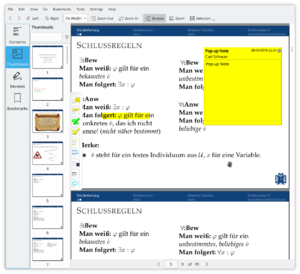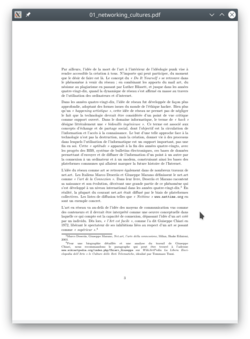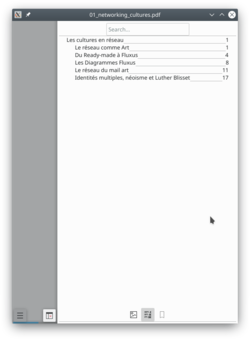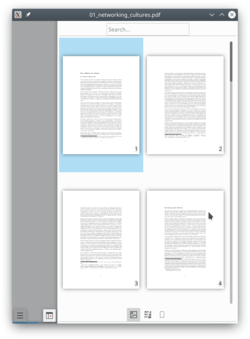Okular/it: Difference between revisions
No edit summary |
Created page with "== Versione mobile ==" |
||
| Line 24: | Line 24: | ||
Puoi comunicare con gli sviluppatori e gli altri utenti su IRC, irc.freenode.org, canale [irc://irc.kde.org/#okular #okular]. | Puoi comunicare con gli sviluppatori e gli altri utenti su IRC, irc.freenode.org, canale [irc://irc.kde.org/#okular #okular]. | ||
Se sei interessato a contribuire allo sviluppo di '''Okular''', [https://okular.kde.org/contact.php contatta la squadra degli sviluppatori]. I programmatori e gli altri volontari sono tutti benvenuti allo stesso modo. | |||
Se sei interessato a contribuire allo sviluppo di '''Okular''', [ | |||
== | <span id="Mobile_Version"></span> | ||
== Versione mobile == | |||
Okular has a mobile version since version 0.16 release in February 2013 <ref>[https://okular.kde.org/news.php Release information]</ref>. The first version was based on the [https://community.kde.org/Plasma/Active active] framework. The mobile viewer was then ported to Kirigami in 2016 by Marco Martin<ref>[https://phabricator.kde.org/R223:eb1f73800e83b11e4a5ae93ac069893aa88f0eaa Commit port mobile version from plasma-framework to kirigami]</ref> and finally to Kirigami2 in 2017<ref>[https://phabricator.kde.org/R223:caf8820cf773316ce41d9a8c1f7357b3ffc3ef86 Commit port mobile version from kirigami to kirigami2]</ref>. | Okular has a mobile version since version 0.16 release in February 2013 <ref>[https://okular.kde.org/news.php Release information]</ref>. The first version was based on the [https://community.kde.org/Plasma/Active active] framework. The mobile viewer was then ported to Kirigami in 2016 by Marco Martin<ref>[https://phabricator.kde.org/R223:eb1f73800e83b11e4a5ae93ac069893aa88f0eaa Commit port mobile version from plasma-framework to kirigami]</ref> and finally to Kirigami2 in 2017<ref>[https://phabricator.kde.org/R223:caf8820cf773316ce41d9a8c1f7357b3ffc3ef86 Commit port mobile version from kirigami to kirigami2]</ref>. | ||
Revision as of 12:52, 4 August 2024
Home » Applications » Graphics » Okular
Cos'è Okular?
Okular è un visore di documenti universale sviluppato da KDE. Funziona in varie piattaforme, tra le quali figurano Linux, Windows, Mac OS X, *BSD, ecc.
Puoi seguire lo sviluppo sulla pagina principale del progetto.
Informazioni
Il suo sviluppo è iniziato come parte del Summer of Code di Google. La descrizione del progetto è disponibile nel KDE Developer's Corner.
Okular combina le eccellenti funzionalità di KPDF alla versatilità del supporto a diversi tipi di documenti, come PDF, Postscript, DjVu, CHM e altri.
La pagina dei formati supportati presenta un grafico che descrive in maggior dettaglio i formati supportati e le funzionalità supportate per ciascuno di essi.

Oltre a supportare molti formati, Okular offre alcune funzionalità come la selezione del testo, la creazione di annotazioni, l'estrazione dei file integrati all'interno di un documento e tante altre sorprese. Le schermate di Okular in azione sono visibili qui.
Puoi comunicare con gli sviluppatori e gli altri utenti su IRC, irc.freenode.org, canale #okular.
Se sei interessato a contribuire allo sviluppo di Okular, contatta la squadra degli sviluppatori. I programmatori e gli altri volontari sono tutti benvenuti allo stesso modo.
Versione mobile
Okular has a mobile version since version 0.16 release in February 2013 [1]. The first version was based on the active framework. The mobile viewer was then ported to Kirigami in 2016 by Marco Martin[2] and finally to Kirigami2 in 2017[3].
The mobile version doesn't support all features from the desktop version, but provide better touch support and a mobile interface.
You can test the mobile version in your PC by entering
okularkirigami
in your terminal. A nightly android version is also available at the KDE binary factory.
Consigli e suggerimenti
Revisione dei documenti
Facendo doppio clic su uno degli strumenti di Revisione (F6) è possibile creare annotazioni multiple senza dover riattivare lo strumento dopo la prima volta.
How to keep the annotations you made to the PDF file:
By default, Okular saves annotations in the local data directory for each user. Since KDE 4.9, it's optionally possible to store them directly in a PDF file by choosing , so they can be seen in other PDF viewers. Note that this feature requires Poppler 0.20 or newer for regular PDF documents. If the PDF document you are annotating is encrypted, this feature requires Poppler 0.22 or newer.
DRM
By default, Okular follows the PDF specification and don't allow copying text from DRM protected files. However, there is an option in the settings to disable DRM limitations in
There was a small controversy in the Debian bug tracker a long time ago, about the default choice to Obey DRM limitations[4][5]. The choice was then explained by an Okular/KPdf developer[6].
PDF Signature and certificate
Okular can verify if a PDF certificate is valid. But you can not yet create a new signature. See the release note for more information.



